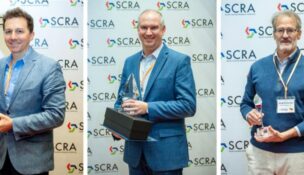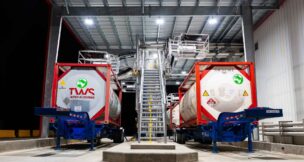SCBIO caps annual conference in Charleston with pitch competition
Jenny Peterson //February 24, 2023//
SCBIO caps annual conference in Charleston with pitch competition
Jenny Peterson //February 24, 2023//
To close out the SCBIO 2023 conference, three South Carolina early startups in the life sciences industry pitched venture capitalists in a “Rapid Fire: SC Super Pitch” competition in the ballroom of the Gaillard Center with hundreds of attendees in the crowd.
Each company had an eight-minute pitch and then two minutes for questions and answers. Three venture capitalists — who had just spoken on a panel about how to give a good pitch — determined the winner, who was awarded $5,000 from SCBIO, a statewide, non-profit, industry association.
Zylo Therapeutics, based in Greenville, won the pitch competition and received the cash prize.
Zylo Therapeutics created and patented “Z-Pod” technology through a powder that can mix with a wide variety of topical creams to enable sustained release properties and increased dosing abilities of those creams. The technology could include enhanced targeting of pores and increased payload and effects of the topical creams without the need for a patch.
“It’s the next generation of topical drug delivery,” said Scott Pancoast, founder and CEO.
Patients who can benefit from Zylo Therapeutics products include those with lesions from advanced Lupus, those who suffer from eczema and other skin diseases, nail fungus and even diaper rash, the company says.
A ketamine-loaded Z pod to help relieve fibromyalgia is already in production. Pancoast said the company has partnered with CY Pharma, which is taking it forward into the clinic and paying for it.
“We actually have a plan of action on (treating) animals as well. The FDA does not require approval for a wound-healing product for animals,” Pancoast said.
 After the pitch, Pancoast said Zylo Therapeutics is already partnering with a CBD company in California to add its powders to CBD cream for sustained releasing benefits.
After the pitch, Pancoast said Zylo Therapeutics is already partnering with a CBD company in California to add its powders to CBD cream for sustained releasing benefits.
“We have the technology, we've got market traction, we actually have revenues and we have no direct competition,” Pancoast said. “We're not in fundraising mode right now, but we're anticipating (for it) later this year and we'll probably be at $10 million.”
The other two South Carolina companies that pitched included Pensievision, a Charleston-based startup that developed 3-D imaging technologies using the same technology found in NASA’s space telescopes to pre-screen for and identify cervical cancer.
Using a pen-shaped wand, health care professionals can get near-immediate detailed 3-D results of a patient’s cervix in a procedure that does not require lab testing. Pensievision, co-created by Joe Carson, an astronomy professor at the College of Charleston, is currently using its endoscope in African countries where health care lab testing and follow-up appointments are a challenge, Carson said.
“We're about one year away from having our first commercial device, so we know we can raise capital funding,” Carson said. “I get asked a lot about why PensieVision is (located) in South Carolina; our clinical studies were done in San Diego, and California is really the world center for companies like ours. But one, it would absolutely be The College of Charleston. We are consistently being fed with brilliant students that power our company. Another is the supportive climate in South Carolina for biomedical startups.”
The third company to pitch was Elevate Therapeutics, which pitched its app, ePAL, that helps terminal patients and hospice employees work together to navigate palliative and end-of-life care with a goal to reduce anxiety, fear and improve quality of life.
Elevate Therapeutics uses artificial technology to collect data about a person’s mood, prompts for how to have tough end-of-life conversations with family members and friends and also connects with hospice employees and much more.
“In a randomized study with 112 stage-four cancer patients, ePAL worked; there was a 26% reduction in patient reported pain and a 69% reduction in pain-related hospital visits … an 82% decrease in pain-related hospital admissions (in the ER). That saved about $112,000, or about a $1,000 per patient per month,” said Mark Elfers, CEO of Elevate Therapeutics, based in Greenville. “The Centers for Medicaid and Medicare Services created a pilot that encouraged Medicare Advantage plans to provide high quality and value based palliative care and hospice care to their beneficiaries. And over the last three years, participation in the pilot has tripled.”
The first ePAL mobile application was built through a $250,000 grant by Dr. Mihir Kamdar, a pain doctor from Mass General Hospital, and a member of the Elevate Therapeutics executive team.
The pitch competition capped off two days of buzz about the life sciences industry in South Carolina that included panel discussions, announcements, vendor spotlights and a breakout series. Attendees learned about the state of the burgeoning industry, wins for the state, new products coming to market, regulatory challenges for the future and more.
“It's wonderful to have our innovative companies present so that you all know what the future is looking like,” said Juliette Bogus, with Inspire Agency and the moderator of the pitch competition. “It's been a great experience for the SCBIO team that we've been able to bring you all together and we've had some great conversations.”
P
















